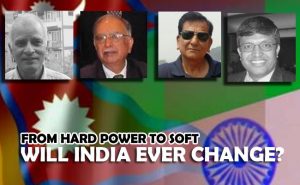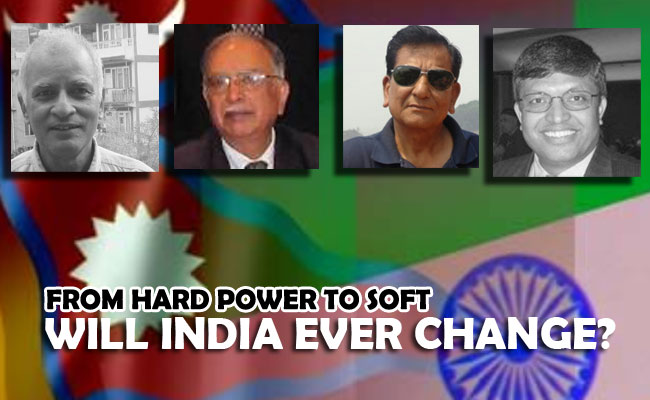N. P. Upadhyaya: He came, saw and conquered the RED leaders of Nepal and prior to his departure, he subtly hinted that his country still could exert influence on Nepali politics more so in the provincial affairs that adjoin the Indian borders.
Modi’s preference of janakpur perhaps gives this impression that in Nepal’s Madhesh he wish to have an Indian constituency. However, Nepal’s Madhesi population are more nationalist than what is being misunderstood by the majority of the Pahadiyas.
The Indian PM Modi came to Nepal as per the dates and places of his personal interests decided by him or his team.
Nepal PM Oli obeyed the Indian dictates verbatim.
He entered Janakpur as if he was the new uncrowned King of Nepal and did all he can to humiliate the receiving host-nation by encouraging in a subtle manner the provincial authorities to speak that they were not happy with the Pahadiya Rulers and that the Indian PM should intervene to compel the ruling elites of Nepal to listen to the grievances of the Madhesi population.
He made them to speak so, this could be guessed looking his past ugly mindset towards Nepal.
He too is an ardent follower of the most hated Nehruvian doctrine.
Or else CM Raut would not have dared to speak so to what he ventilated while felicitating the Indian PM. It was all a calculated plan of the Indian establishment presumably.
Look the timing of CM Raut’s fiery speech against the Pahadiyas which coincided with the open call of one Indian senile person called Kirti Azad who clearly appealed Indian PM to take over the Janakpur, in effect a part of Mithilanchal landmass, and assimilate in Indian Territory.
 The brazen insult of the Nepali flag, never witnessed before, was a deliberate act which demands a probe and the criminal being penalized.
The brazen insult of the Nepali flag, never witnessed before, was a deliberate act which demands a probe and the criminal being penalized.
All these political aberrations must not have happened but it did happen and that too while the Indian PM was in janakpur. Just try to link the chain of events with each other with how India imposed economic blockade on Nepal for having grossly ignored the shifting of the promulgation of the new national Charter without convincing the people residing in Nepal’s Madhesh.
Madhesh is now whole of Nepal for the Indian PM henceforth. India is limited to Madhesh only. Very sad.
But the Nepali nationalism which was in deep slumber attained a new height and the blockade thus had to be scrapped after six months. Nepali nationals residing in Madhesh too contributed their efforts in minimizing the blockade pain.
That Indian mindset has not changed has best been assessed by Nepal’s retired career diplomats and experts on international relations.
Modi has not changed. His previous agenda on Nepal remains intact even as of today. And whatever he may have said while being in Nepal this time, May 11-12, 2018, were nothing more than polishing Nepal-India ties with a religious paint. That’s all.
This is not this scribe’s conclusion but of those senior career diplomats who have had served this nation in the previous decades very efficiently.
Without wasting your precious time, let me come to the real topic straight.
The retired diplomats perhaps are unanimous in concluding that Indian mood towards Nepal has not changed at all but instead continues to be what it used to be during the days prior to the blockade days and after.
“There is no shift in Indian agenda on Nepal for the better”, the former Nepali diplomats said on May 16, 2018, at a program organized at the Nepal’s foreign ministry to assess the Nepal-India ties after Modi’s fresh Nepal visit.
Albeit, the diplomats did agree on the notion that India appears to have shifted to the use of “soft power” as regards its dealings with Nepal.
Some even said that Modi still thinks that the Nepali constitution demands a fresh amendment that accommodates the Nepal Madhesh feelings and aspirations and is watching the demarcation of provinces of Nepal with special interest which by implication means that the Indian stance on Nepal has yet to change.
Modi’s chaiwals image though is popular in Nepal.
Mr. Sundar Nath Bhattarai, Ambassador to Thailand, authentically claims that PM Modi this time visited Nepal only to block the advance of China in South Asia through Nepal.
No less interesting was the comment made by Pushkar Man Rajbhandary, (Ambassador in Pakistan prior to retirement), who said that “what if people from other faiths and religions demand a different circuit much similar to what has been recently inaugurated as the Ramayana Circuit? We must have thought of this issue in advance prior to declaring the Ramayana circuit, he raised tentatively a valid point at the program.
The chances remain.
Former Foreign Secretary, Madhu Raman Acharya, Ambassador to Bangladesh, bluntly told that “when the use of hard power failed in Nepal’s case, the Indian PM now appears to have taken interest in painting the Nepal-India ties with that of the emulsion of religion to give an impression to the people of Nepal that religion wise we were one”.
According to Ambassador Madhu Raman Acharya, India has not yet taken the blockade as an Indian blunder made then which speaks so many things unspoken.
Perhaps Mr. Acharya was talking of the distorted Indian attitude.
All political parties in Nepal must formulate a common foreign policy because parties talk different when in power and begin speaking just the opposite while being in the footpath, added MR Acharya-the seasoned diplomat.
Yet another expert on international relations, Dwarika Nath Dhungel demanded that the Nepal’s foreign ministry should be smart enough in dealing with acute foreign policy issues or else why the nation needed this white elephant?
Retired General Keshar Bahadur Bhandari said that “Indian eyes are constantly on Nepali Rivers.
“Bilateral relations can never be special” added the retired General.
Mr. Dipak Adhikari and Mrs.Sangita Tapaliya from the JNU also spoke on the occasion.
Thus the program ended with a note wherein the diplomats ventilated their inner feelings and exposed the Indian mindset that prevails in Delhi even as of today as regards Nepal. Observers opine that such interactions should be encouraged in between the academia, diplomats and media men alike.
Nepal: Will India ever change…Never!

